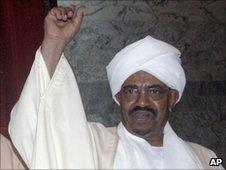Darfur warrant for Sudan's Bashir: ICC adds genocide
- Published

Omar al-Bashir denies arming pro-government militias in Darfur
The International Criminal Court has issued a second arrest warrant for Sudan's President Omar al-Bashir - this time for charges of genocide.
He already faces charges of war crimes and crimes against humanity, which he denies.
The ICC first indicted him in March 2009, but he has not been arrested.
A member of Mr Bashir's political party labelled the new warrant "ridiculous", but rebels in Sudan's western Darfur region hailed it as "a victory".
President Bashir is accused over the conflict in Darfur, where some 300,000 people are said to have died in seven years of fighting.
'No concern'
The ICC had initially declined to add genocide to the indictment but this has been overturned on appeal, with the judges finding "there are reasonable grounds to believe him responsible for three counts of genocide".
Pro-government Arab militias are accused of ethnic cleansing against civilians from the Fur, Masalit and Zaghawa communities after rebels took up arms in Darfur in 2003.
Mr Bashir has denied that his government armed the militias, known as the Janjaweed.
Some 2.5 million people have been driven from their homes.
Sudan's leader has been unable to visit several countries for fear of being arrested since the first warrant was issued.
Many African and Arab countries have lobbied for the UN Security Council to postpone the prosecution, but this request has been rejected by countries such as the US and the UK.
Mr Bashir is accused of "genocide by killing, genocide by causing serious bodily or mental harm and genocide by deliberately inflicting on each target group conditions of life calculated to bring about the group's physical destruction", said a statement from the ICC.
"This second arrest warrant does not replace or revoke in any respect the first warrant of arrest," The Hague-based court said.
A senior member of the ruling National Congress Party, Rabie Abdelatie, called the move "ridiculous" and said the ICC was targeting not just Mr Bashir but the Sudanese people.
Sudanese Information Minister Kamal Obeid said in a statement: "The adding of the genocide accusation confirms that the ICC is a political court. The ICC decision is of no concern to us."
But Ahmad Hussein, a spokesman for Darfuri rebel group the Justice and Equality Movement, told AFP news agency the development was "a victory for the people of Darfur and the entire humanity".
Despite the charges against him, Mr Bashir was overwhelmingly re-elected as president in landmark elections in April.
The opposition, however, accused him and his supporters of rigging the poll and some major groups boycotted the elections.
Mr Bashir has always said the problems in Darfur were being exaggerated for political reasons.
According to the joint UN-African Union peacekeeping mission in Darfur, Unamid, 221 people were killed in Darfur in June.
This is a sharp fall since May, when some 600 people were killed - the deadliest month since January 2008, when the UN took joint control of the peace force.
Fighting intensified in May after the Justice and Equality Movement pulled out of peace talks.